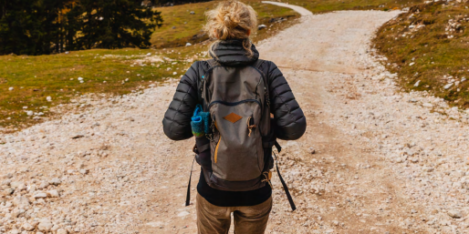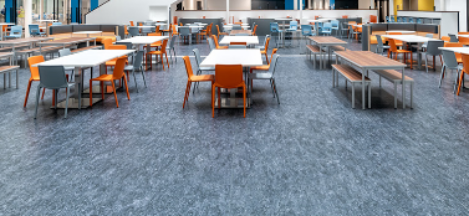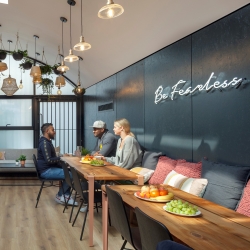To provide the best experiences, we use technologies like cookies to store and/or access device information. Consenting to these technologies will allow us to process data such as browsing behaviour or unique IDs on this site. Not consenting or withdrawing consent, may adversely affect certain features and functions.
The technical storage or access is strictly necessary for the legitimate purpose of enabling the use of a specific service explicitly requested by the subscriber or user, or for the sole purpose of carrying out the transmission of a communication over an electronic communications network.
The technical storage or access is necessary for the legitimate purpose of storing preferences that are not requested by the subscriber or user.
The technical storage or access that is used exclusively for statistical purposes.
The technical storage or access that is used exclusively for anonymous statistical purposes. Without a subpoena, voluntary compliance on the part of your Internet Service Provider, or additional records from a third party, information stored or retrieved for this purpose alone cannot usually be used to identify you.
The technical storage or access is required to create user profiles to send advertising, or to track the user on a website or across several websites for similar marketing purposes.
 The COVID-19 pandemic is driving a fundamental shift in the way companies operate, accelerating the need for an adaptable and agile workforce to drive business success. According to Mercer’s 2021 Global Talent Trends study, the financial impact and work-life disruption caused by the pandemic is causing UK employers to focus on redefining flexibility and skills development to ensure their business and employees become more resilient and agile in the face of disruption.
The COVID-19 pandemic is driving a fundamental shift in the way companies operate, accelerating the need for an adaptable and agile workforce to drive business success. According to Mercer’s 2021 Global Talent Trends study, the financial impact and work-life disruption caused by the pandemic is causing UK employers to focus on redefining flexibility and skills development to ensure their business and employees become more resilient and agile in the face of disruption.







 Opening its doors in late 2020, The Inverurie Community Campus in Aberdeenshire is a new £55m facility. One of the largest school constructions in Scotland, its 360 rooms accommodate 1,600 pupils and provides amenities such as a youth café, a community centre, and a swimming pool for students and the wider community.
Opening its doors in late 2020, The Inverurie Community Campus in Aberdeenshire is a new £55m facility. One of the largest school constructions in Scotland, its 360 rooms accommodate 1,600 pupils and provides amenities such as a youth café, a community centre, and a swimming pool for students and the wider community. 
 Let’s be honest, work life pre 2020 had its flaws, whilst the longing for variety of scenery, change of pace and even a train journey (somewhere…ANYWHERE) would be welcomed by many of us right now, many of us had become a bit ‘hamster wheel’ in our approach. Commuting was stressful, expensive and time hungry; our natural and individual rhythms squeezed into a set 9-5 schedule and workplace design had become a bit ‘quantity over quality’ – desks have been reducing in size year upon year in order that capacity could be increased. We had reached a point at which everything was ripe for change but there was largely a resistance to both flexible working requests and embracing much of the technological advancements that were already at our fingertips.
Let’s be honest, work life pre 2020 had its flaws, whilst the longing for variety of scenery, change of pace and even a train journey (somewhere…ANYWHERE) would be welcomed by many of us right now, many of us had become a bit ‘hamster wheel’ in our approach. Commuting was stressful, expensive and time hungry; our natural and individual rhythms squeezed into a set 9-5 schedule and workplace design had become a bit ‘quantity over quality’ – desks have been reducing in size year upon year in order that capacity could be increased. We had reached a point at which everything was ripe for change but there was largely a resistance to both flexible working requests and embracing much of the technological advancements that were already at our fingertips. 
 HR leaders are finding it increasingly difficult to quickly find and develop talent with the most in demand skills, yet 58 percent of the workforce needs new skill sets to get their jobs done, according to
HR leaders are finding it increasingly difficult to quickly find and develop talent with the most in demand skills, yet 58 percent of the workforce needs new skill sets to get their jobs done, according to 
 Microsoft has announced Microsoft Viva, which it claims is the first employee experience platform to bring tools for employee engagement, learning, wellbeing and knowledge discovery, directly into people’s workflow. Viva is designed to help employees ‘learn, grow and thrive’ in the new era of working life, and is designed to work alongside existing solutions such as Microsoft 365 and Microsoft Teams.
Microsoft has announced Microsoft Viva, which it claims is the first employee experience platform to bring tools for employee engagement, learning, wellbeing and knowledge discovery, directly into people’s workflow. Viva is designed to help employees ‘learn, grow and thrive’ in the new era of working life, and is designed to work alongside existing solutions such as Microsoft 365 and Microsoft Teams. 
 Amazon has submitted plans for its new $2.5 billion headquarters campus, known as HQ2, in Arlington County. Virginia. The NBBJ designed proposal for the PenPlace campus includes a 350 ft glass tower, three 22-story towers offering 2.8 million sq. ft of office space, a 250-seat outdoor amphitheatre, public green space, and several other buildings. The centre piece tower, officially dubbed The Helix, is a plant covered structure to emphasize the firm’s commitment to the environment and biophilic design.
Amazon has submitted plans for its new $2.5 billion headquarters campus, known as HQ2, in Arlington County. Virginia. The NBBJ designed proposal for the PenPlace campus includes a 350 ft glass tower, three 22-story towers offering 2.8 million sq. ft of office space, a 250-seat outdoor amphitheatre, public green space, and several other buildings. The centre piece tower, officially dubbed The Helix, is a plant covered structure to emphasize the firm’s commitment to the environment and biophilic design. 
 When the COVID-19 crisis hit the UK in March 2020, many commented that the virus didn’t discriminate and that its impact would be felt equally by everyone. However, as highlighted in Nuffield Health’s
When the COVID-19 crisis hit the UK in March 2020, many commented that the virus didn’t discriminate and that its impact would be felt equally by everyone. However, as highlighted in Nuffield Health’s 


 Be by
Be by 
 ‘Stress by Sector’ data released by
‘Stress by Sector’ data released by 
 There’s no question that many people now, feeling the weight of lockdown 3 and with no clear view on the timing of any sort of ‘return to normal’, are finding it tough to stay motivated. Many are burnt out. We can gain some insight into what is going on for many individuals by way of neuroscience, specifically how the brain works and how it copes with changing situations.
There’s no question that many people now, feeling the weight of lockdown 3 and with no clear view on the timing of any sort of ‘return to normal’, are finding it tough to stay motivated. Many are burnt out. We can gain some insight into what is going on for many individuals by way of neuroscience, specifically how the brain works and how it copes with changing situations. 








February 10, 2021
Ten point green plan needs to be embraced by organisations
by Paul Scriven • Comment, Environment